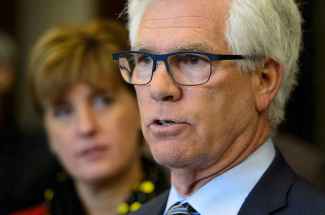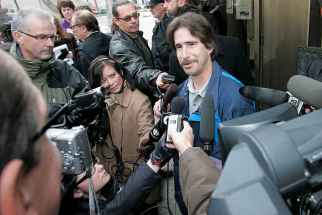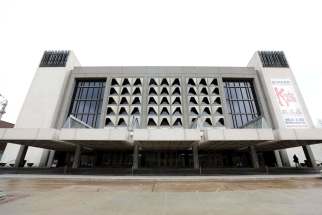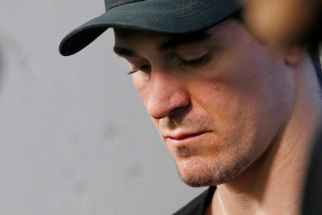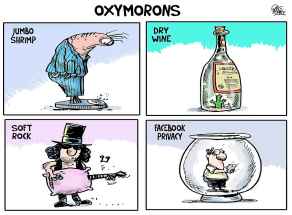Unger settlement highlights high cost of bad justice
Read this article for free:
or
Already have an account? Log in here »
To continue reading, please subscribe:
Monthly Digital Subscription
$0 for the first 4 weeks*
- Enjoy unlimited reading on winnipegfreepress.com
- Read the E-Edition, our digital replica newspaper
- Access News Break, our award-winning app
- Play interactive puzzles
*No charge for 4 weeks then price increases to the regular rate of $19.00 plus GST every four weeks. Offer available to new and qualified returning subscribers only. Cancel any time.
Monthly Digital Subscription
$4.75/week*
- Enjoy unlimited reading on winnipegfreepress.com
- Read the E-Edition, our digital replica newspaper
- Access News Break, our award-winning app
- Play interactive puzzles
*Billed as $19 plus GST every four weeks. Cancel any time.
To continue reading, please subscribe:
Add Free Press access to your Brandon Sun subscription for only an additional
$1 for the first 4 weeks*
*Your next subscription payment will increase by $1.00 and you will be charged $16.99 plus GST for four weeks. After four weeks, your payment will increase to $23.99 plus GST every four weeks.
Read unlimited articles for free today:
or
Already have an account? Log in here »
Hey there, time traveller!
This article was published 01/05/2019 (2419 days ago), so information in it may no longer be current.
Thanks to an out-of-court settlement and non-disclosure agreement, few will know for sure how much Manitoba is going to pay Kyle Unger for the 14 years he spent in prison for a murder he did not commit.
If the normal rules of civil proceedings played any role, it could be a substantial sum.
Unger was convicted in 1992 for the grisly murder of 16-year-old Brigitte Grenier at a summer music festival. He was granted bail in 2005, after it was determined a hair used to convict him belonged to someone else.

In 2009, after a lengthy review by the federal justice department, then-justice minister Rob Nicholson quashed the conviction and ordered a new trial. Manitoba Justice decided instead to drop the charges.
If you start counting from 2005 — the date at which it was shown he was the likely victim of a miscarriage of justice — it took another 14 years to reach a settlement. Unger was fighting for compensation for as long as he was behind bars.
In civil proceedings, that is called an aggravating factor. In other words, it is likely Unger received a larger sum because Manitoba Justice took so long to acknowledge it had convicted the wrong man and compensate him for the trauma of being wrongly accused, convicted and imprisoned.
That should anger most sensible Manitobans. But if that doesn’t start your blood to boiling, consider Manitoba Justice had a golden opportunity to do right by Unger nearly 12 years ago.
In February 2007, the commission of inquiry into the wrongful conviction of James Driskell recommended Manitoba Justice undertake a review of all cases handled by former prosecutor George Dangerfield.
This was no idle recommendation: Driskell represented the second time one of Dangerfield’s high-profile cases were revealed to be wrongful convictions. Dangerfield was also responsible for the wrongful prosecution of Thomas Sophonow, who was the subject of a 2001 judicial inquiry which found multiple instances of prosecutorial misconduct.
With the knowledge a single prosecutor had been at the helm for two miscarriages, then-justice minister Dave Chomiak retained former Ontario Superior Court judge Roger Salhany to review Dangerfield’s other cases. It was hoped any flagged by Salhany could be fast-tracked through the federal criminal conviction review process, with a joint-recommendation from Manitoba Justice and non-profit legal group Innocence Canada (then called Association in Defence of the Wrongly Convicted).
It soon became clear Manitoba Justice was going to severely limit the scope. Salhany was not provided with any investigatory powers, and by all accounts, got little or no co-operation from the prosecutions branch. As a result, it is widely believed Salhany never got the opportunity to review Unger’s case nor others that featured the tell-tale signs of a wrongful conviction.

Manitoba Justice was asked this week if Salhany had submitted any report, memorandum or missive about any of Dangerfield’s cases. By Wednesday night, the department had failed to provide an answer.
Innocence Canada, however, believes nothing exists — driving the organization that has helped exonerate two dozen people to demand a new, full review of Dangerfield’s cases.
Even though there have been many cases come and go since Salhany was tasked, there is still a compelling reason to launch a review. Namely, the rapidly growing tab being charged to taxpayers for Dangerfield’s alleged misdeeds.
Even though we don’t know Unger’s figure — he was seeking $14 million — we do know Sophonow received $2.9 million and Driskell got $4 million.
Now, let’s consider the other Dangerfield cases that are making their way towards a settlement.
Frank Ostrowski’s murder conviction was quashed by the Manitoba Court of Appeal late last year, and he is in the early stages of a civil lawsuit.
There are no fewer than three additional Dangerfield cases at various stages of the federal convictions review process: Roger Sanderson, who was convicted of first-degree murder in a trio of gangland slayings; Brian Andersen, who was convicted of murder for the 1973 beating death of a man in downtown Winnipeg; and Mohamed Khan, who was convicted in 1994 of murdering his wife.
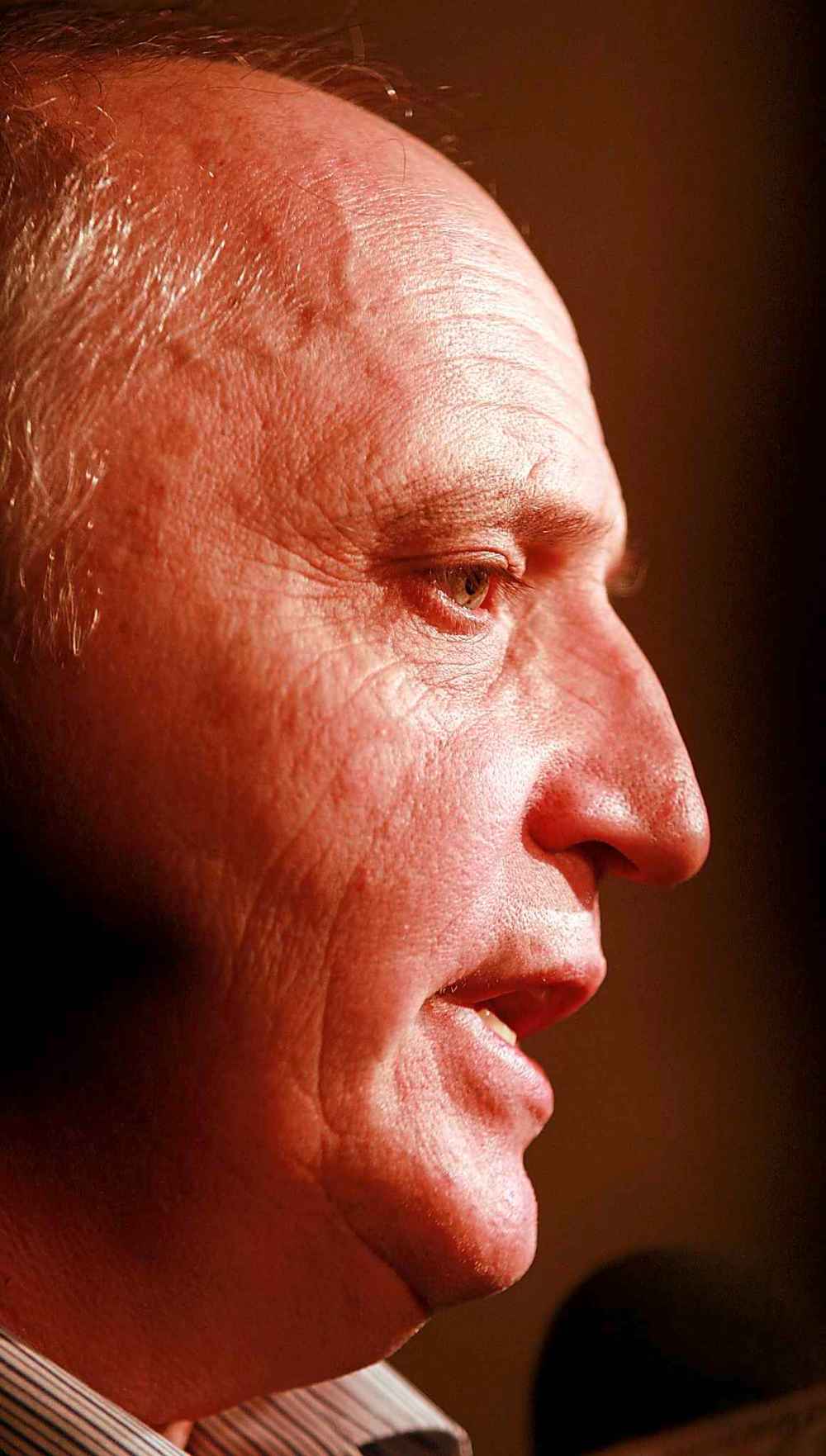
When you look at all seven cases together, and the exposure they represent for the provincial treasury, it makes you wonder why Manitoba Justice was so reluctant to allow Salhany to do a thorough review in 2007.
It’s a question that has haunted James Lockyer for more than a decade.
“If Justice Salhany had been given more powers and been allowed to do his work, the process would have gone much quicker for many of the cases handled by Mr. Dangerfield,” said Lockyer, a Toronto lawyer and co-founder of Innocence Canada. Lockyer has or still is representing Driskell, Unger, Ostrowski and Khan.
“Unfortunately, Manitoba Justice appears to have made sure that Salhany accomplished nothing. I don’t think that is Salhany’s fault; he was wasn’t given any powers or encouragement to follow through.”
Lockyer said there are precedents in this country for provinces supporting the federal review of a possible wrongful conviction. In Ontario, in several cases, the provincial justice department consented to references to the Ontario Appeal Court and the Supreme Court of Canada, he added.
“By consenting, Ontario shortened the amount of time needed to quash these convictions,” Lockyer said.
Manitoba, on the other hand, has consistently demonstrated an adversarial, almost hostile reaction to any claims of wrongful conviction, particularly in any case involving Dangerfield.
(Dangerfield, who is in his 80s and believed to be living in British Columbia, has previously declined repeated requests for comment from the Free Press.)

Manitoba Justice has not just refused to consent to judicial reviews of Dangerfield cases, it has repeatedly sent prosecutors or contract lawyers to court to contest the results of federal conviction reviews and judicial orders to quash the convictions of men who spent decades in prison for crimes they did not commit.
As Lockyer noted, Manitoba Justice is not just “defending old verdicts, they seem to be actively defending an individual prosecutor, which is odd.”
Not just odd. It this instance, it was an unjust and ultimately expensive way of doing business.
dan.lett@freepress.mb.ca
Manitoba Justice on Salhany review
Statement from Manitoba Justice on the appointment of former Ontario Superior Court judge Robert Salhany:
“Following discussions with the Association in Defence of the Wrongfully Convicted (AIDWYC) regarding an appropriate person to conduct an independent review of Mr. Dangerfield’s cases, Manitoba retained former Justice Salhany in 2007 for that purpose. Manitoba Justice worked with AIDWYC to determine which cases and what process would be followed in the review. Justice Salhany, representatives from AIDWYC, and Manitoba Prosecution Service met in 2007 to discuss the process and parameters.
“The first case to be reviewed was the Ostrowski matter and Justice Salhany commenced a review of the case which continued into 2008. It is our understanding that a section 696 application under the Criminal Code was brought by AIDWYC in the course of the process and the independent review was shifted to the federal minister, which ended Justice Salhany’s review.
“Independent reviews of alleged wrongful convictions since that time have been through the section 696 process to the federal minister. Manitoba cooperates fully with the reviews of alleged wrongful convictions under section 696 of the Criminal Code that are brought by individuals who have been convicted of offences and make application to have them reviewed by the federal justice minister. This includes providing them with the prosecution files to assist them in their review.”

Born and raised in and around Toronto, Dan Lett came to Winnipeg in 1986, less than a year out of journalism school with a lifelong dream to be a newspaper reporter.
Our newsroom depends on a growing audience of readers to power our journalism. If you are not a paid reader, please consider becoming a subscriber.
Our newsroom depends on its audience of readers to power our journalism. Thank you for your support.
History
Updated on Thursday, May 2, 2019 8:34 AM CDT: Adds comment from Manitoba Justice on Salhany





